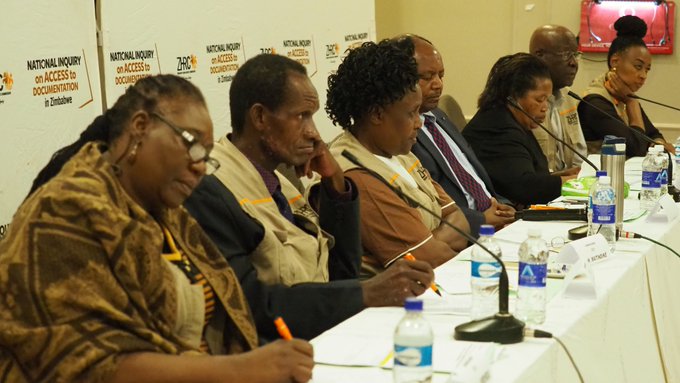By Joyce Mukucha
The Zimbabwe Human Rights Commission (ZHRC) public hearings process on the National Inquiry on Access to Documentation in Zimbabwe for Harare Metropolitan Province roared into life aimed at resolving a human rights problem that is widespread and recurring thereby affecting a significant number of people in Zimbabwe pertaining the issuance of national documents.
Briefing the Media in Harare on the 18th of November 2019, the ZHRC chairperson Commissioner Elasto Hilarious Mugwadi said the National Inquiry was the first to be conducted in Zimbabwe and the development signifies a major growth in strategies being utilised by the Commission to promote, protect and enforce human rights.
“Access to documentation is a fundamental human right guaranteed by the Constitution of Zimbabwe and facilitates the enjoyment of other rights. Through this National Inquiry, the commission seeks to inquire the challenges in accessing national documents and the extent to which they affect people in Zimbabwe,” he said.
Formulating recommendations and follow-up actions, he said, was vital in addressing barriers identified in accessing national documents.
Commissioner Mugwadi added that people were becoming vulnerable and susceptible to exploitation, abuse and modern forms of slavery and servitude following that many are left with no choice but to cross boarders illegally due to lack of passports.
“The commission has observed that with the prevailing socio-economic challenges, possession of passport does not only facilitate freedom of movement as contemplated in Section 66 of the Constitution but it is also a source of livelihood. Many of our people today survive on cross-border trade. Without national documents, enjoyment of rights for them is therefore limited as their personal security and human dignity is not protected,” he said.
Following the meeting in preparation of these public hearings which were held in Harare on the 5th of November 2019, seven districts in the Province were visited and a total number of 5 044 was engaged. Of these, 3 632 were females and one 1412 were males. 17 were people with disabilities. A total of 1 125 witness and stakeholder submission were received, 1 095 forms were also submitted by individual witnesses and 30 by stakeholders outlining the challenges they are facing pertaining accessing documents.
The Districts included Chitungwiza, Hatcliffe (Harare North), Highfield, Ruwa-Epworth, Mabvuku-Tafara, Waterfalls (Harare South) and Harare Central.
For Harare Metropolitan Province, preliminary findings indicate that lack of documentation has also been attributed to withholding of birth records by health institutions due to failure by parents to settle hospital bills.
Alleged corruption by the Registrar General’ s office, lack of documentation caused by parents of foreign origin especially those from Malawi and Mozambique in the areas such as Mufakose, Highfield and Harare South as well as prohibitive costs of citizenship certificates are other challenges which were stated as affecting the majority.
The National Inquiry which will take place until the 22nd of November 2019 also seeks to review the effectiveness of existing laws, policies, procedures and institutions relating to access to national documents in Zimbabwe.
Oral evidence from selected seven Districts in the Province will be received by the Commission and the written submission as well will feed into the National Inquiry Report.






